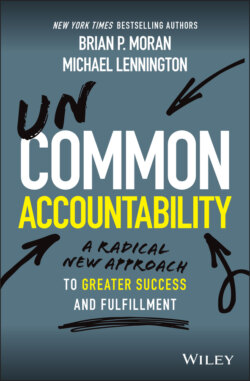Читать книгу Uncommon Accountability - Michael Lennington - Страница 6
1 ACCOUNTABILITY AS OWNERSHIP
ОглавлениеWhat if there was one basic human trait that was the foundation of virtually everything that we achieve in life? One characteristic that creates our results, fosters our learning and growth, keeps us sharp and adaptable, builds healthy relationships, improves our mental and physical health, and positively influences nearly everyone that we associate with?
And what if this one thing, this ground‐spring of lasting success in life, was also perhaps the most widely misunderstood concept in our culture today? What if the way that most of us think about and apply this fundamental success concept causes many to live a life of mediocrity, disappointment, and frustration rather than the life we are truly capable of? What if the way that most of us engage this concept actually creates the exact opposite of what we desire in life?
If you're like me, you're an avid reader. I learned early on that “leaders are readers,” and one particular area of interest for me has always been the strategies, habits, and behaviors of successful people. While I've lost count of all the books that I've read in this genre, some classics like The 7 Habits of Highly Effective People by Stephen Covey, as well as more recent works such as Atomic Habits by James Clear, stand out to me. In the end, many of these books have positively impacted my success in business, and in life.
Most of the books I've read on this topic identify a set of foundational characteristics and habits that contribute to high achievement. Interestingly, though, many of these works contain different success attributes! While this seemed confusing to me at first, I'm now fine with the variation. The diversity of ideas tells me that there is more than one formula for success in life. That, in and of itself, is encouraging. Over my career, I've applied much of what I learned from these books, and I have benefited greatly.
However, as I have applied the concepts from these books, and developed a few of my own, there is one characteristic that I've found has had by far the greatest impact on my success and my happiness. This one characteristic is common in almost all of the successful people that I've met or studied. It is the one characteristic that is the bedrock of success and achievement. In fact, without it, none of the ideas in all of the books that I've read on self‐improvement can deliver on their potential. Yet, this characteristic is also the most frequently misunderstood concept in business and in society today. And this misunderstanding creates the very opposite of what we intend.
I am talking about personal accountability, and flipping the way we understand and apply this principle is the mission of this book.
Our experience, working with over one hundred Fortune 1000 companies and tens of thousands of individuals, is that there is a fundamental misperception of what accountability truly is.
Intuitively, most sense that accountability is a good thing, something that leads to better performance and increased results, yet we most often experience accountability as something that is far less than empowering – and in fact is often disempowering. Too often, accountability is synonymous with consequences – in particular, negative consequences. Virtually everywhere you hear accountability mentioned in society, it is typically affiliated with bad behavior, poor performance, and negative consequences. It is a wonder that anyone would want anything to do with it.
Let me give you an example. Let's say a professional athlete does something egregious. What typically happens is that someone in authority – usually the coach or the commissioner – calls a press conference or releases a statement where they assert that they intend to “hold this person accountable” for the offensive actions. Then they fine, suspend, or fire the athlete. In other words, they create some form of negative consequence.
And this approach to accountability is not just reserved for the famous. We all have experienced something like this at various times in our lives. Most often, when accountability is mentioned or practiced it is really just the application of negative consequences.
The costs of this misunderstanding are significant. If we experience accountability as negative consequences and punishment, then it only makes sense that, on an individual level, we would be smart to avoid it. Yet when we shun accountability, there are significant downsides; we often repeat mistakes, miss opportunities, fail to learn and adapt, and generally underperform relative to our potential. At the organizational level, when leaders use negative consequences to shape behavior, they create unintended collateral damage, and ultimately limit individual and group performance. Leaders with this misguided view of accountability create a culture of unmet milestones, missed opportunities, and poor results. The prices of this mindset include lost productivity, lower quality, customer dissatisfaction, low morale, high turnover, lower sales, and diminished profits.
Few words in the English language carry the emotional impact that accountability does. Simply mentioning the word can create powerful physiological and emotional responses in the hearer. Accountability has undeniable power to create results, and yet for many people, when it's promoted by someone with authority, the word often elicits anxiety and engenders avoidance behaviors. There is a reason for this accountability anxiety, and it starts with the widely promulgated meaning of accountability.
The early 2020 version of Merriam‐Webster's online dictionary defines accountability as (emphasis and underlines are mine):
